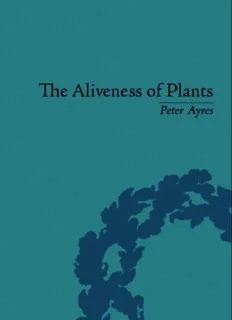
The Aliveness of Plants. The Darwins at the Dawn of Plant Science PDF
Preview The Aliveness of Plants. The Darwins at the Dawn of Plant Science
THE ALIVENESS OF PLANTS: THE DARWINS AT THE DAWN OF PLANT SCIENCE THE ALIVENESS OF PLANTS: THE DARWINS AT THE DAWN OF PLANT SCIENCE by Peter Ayres london PICKERING & CHATTO 2008 Published by Pickering & Chatto (Publishers) Limited 21 Bloomsbury Way, London WC1A 2TH 2252 Ridge Road, Brookfi eld, Vermont 05036-9704, USA www.pickeringchatto.com All rights reserved. No part of this publication may be reproduced, stored in a retrieval system, or transmitted in any form or by any means, electronic, mechanical, photocopying, recording, or otherwise without prior permission of the publisher. © Pickering & Chatto (Publishers) Ltd 2008 © Peter Ayres 2008 british library cataloguing in publication data Ayres, P. G. (Peter G.) Th e aliveness of plants: the Darwins at the dawn of plant science 1. Darwin, Charles, 1809–1882 2. Darwin, Francis, Sir, 1848–1925 3. Dar- win, Erasmus, 1731–1802 4. Botanists – Great Britain – Biography 5. Botany – Great Britain – History – 18th century 6. Botany – Great Britain – History – 19th century I. Title 580.9’22’41 ISBN–13: 9781851969708 ∞ Th is publication is printed on acid-free paper that conforms to the American National Standard for the Permanence of Paper for Printed Library Materials. Typeset by Pickering & Chatto (Publishers) Limited Printed in the United Kingdom at the University Press, Cambridge CONTENTS Acknowledgements vii List of Tables ix List of Figures xi 1 Green Th reads across the Ages: A Brief Perspective on the Darwins’ Botany 1 2 Th e Fortunes of the Darwins 5 3 Th e Misfortunes of Botany 23 4 Erasmus Darwin’s Vision of the Future: Phytologia 31 5 Charles Darwin’s Evolutionary Period 55 6 Charles Darwin’s Physiological Period 79 7 Charles Darwin, Francis Darwin and Diff erences with von Sachs 97 8 Francis Darwin, Cambridge and Plant Physiology 115 9 Francis Darwin, Family and his Father’s Memory 137 10 Fortune’s Favourites? 159 11 Where Did the Green Th reads Lead? Th e Botanical Legacy 171 Notes 191 Works Cited 209 Index 221 ‘It might be called, “On the aliveness of plants” which I think sounds more attractive than the life of plants’. Francis Darwin replies to William Rothenstein’s invitation to give a talk to a village society, Monday 23 March 1914 (Rothenstein Letters, Houghton Library, Harvard University). ACKNOWLEDGEMENTS Francis was the fi rst Darwin to whom I was introduced. We met when I writ- ing a biography of Harry Marshall Ward, the distinguished plant pathologist. Th e two men were of similar age and met when young, while they were learning their trade – botany. Th eir friendship was sustained throughout their lives and for the last years of Harry’s life they were colleagues in Cambridge. I must there- fore thank Harry for kindling my interest in the Darwin family. My interest in Francis owes much also to my own friend and colleague at Lancaster University, Terry Mansfi eld, an eminent stomatal physiologist. My thanks go to Terry for reminding me oft en that Francis was a pioneer of stomatal physiology and that he and his father, Charles, were pioneers in the study of plant movements. It was clear to me that in order to understand Francis’s achievements I had to know how much he had been inspired by his illustrious father. And for comparable reasons, Charles led me in turn to his grandfather, Erasmus. Where their botany was concerned, the Darwins could not be separated. Desmond King-Hele’s and Jenny Uglow’s writings were wonderful guides to Erasmus, but I think my enthusiasm for Darwins might have faded if it had not been for the personal encouragement of Janet Browne, that great authority on Charles. She welcomed me, an outsider, to the world of Darwin students. Among other Darwin experts who kindly pointed me in the right directions in Cambridge, where most of the archives are to be found, were John Parker (Plant Sciences) and staff of the Darwin Correspondence Project (University Library) particularly Gina Murrell, Alison Pearn and Andrew Sclater. Also in Cambridge, and due my thanks for their researches on my behalf, are Christine Alexander (Plant Sciences), Jacqueline Cox (University Archives), Colin Higgins (Christ’s College) and Anne Th omson (Newnham College). Torri Reeve (English Herit- age), Stephanie Jenkins (local historian), and Stephen Foster and Vic Anderson (Southampton University): each tracked down for me information about the per- sonal lives of the Darwins. When I was learning about Ingen-Housz, Sachs and Henslow, botanists whose lives impinged signifi cantly on those of the Darwins, Norman and Elaine Beale, Howard Gest, Wolfram Hartung and Max Walters gave – vii – viii Th e Aliveness of Plants me invaluable advice and material help. So, too, did Peter Lea about Lawes, Gilbert and the early days of Rothamsted Experimental Station. At Lancaster University, Alan Shirras (Biological Sciences), Sue Clarke and Jacqueline Whiteside (Library) helped me access the Rothenstein Collection of letters in the archives at the Houghton Library, Harvard University. Closer to home, staff in the libraries of Oxford University (old Bodleian, Corpus Christi College, Somerville College, and especially Plant Sciences and the Radcliff e Sci- ence Library) have been unfailingly friendly and helpful. Finally I thank my wife, Mary, for her encouragement. Her interest and practical help during numerous fact-fi nding expeditions gave me the energy to complete the project. LIST OF TABLES 4.1: Early Contributions to an Understanding of the Function of Leaves 32 4.2: Results of Lawes, Gilbert and Pugh’s Experiments into the Nitrogen Yields of Diff erent Crops at Harvest 54 6.1: Charles Darwin’s Major Interests in Plants (Modifi ed from T. Veak, ‘Exploring Darwin’s Correspondence; Some Important but Lesser Known Correspondents and Projects’, Archives of Natural History, 30 (2003), pp. 118–38) 80 – ix –
Description: